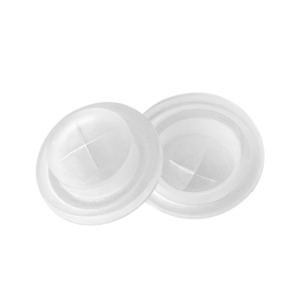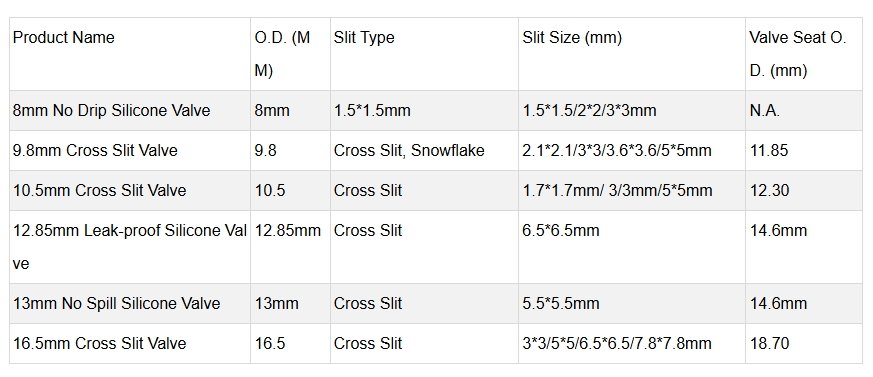Tipi di valvole al silicone
- Valvola unidirezionale in silicone
- Valvola a fessura incrociata in silicone
- Guarnizione della valvola in silicone
- Valvola di controllo del tappo della bottiglia
- Bottiglia di ketchup Valvola in silicone, ecc...
Dimensioni comuni
Le valvole in silicone sono disponibili in varie dimensioni e possono essere personalizzate in base alle specifiche esigenze applicative. Le dimensioni più comuni includono:
Gamma di diametri: 2 mm - 50 mm
Spessore: 0,3 mm - 5 mm
Tipi di apertura: Fessura a croce, fessura a V, apertura circolare, ecc.
Disponiamo di dimensioni T-10, T-13, T-16 in stock.
Applicazioni
1. Industria alimentare e delle bevande
Valvole di ritegno per tappi di bottiglia
Valvole in silicone per bottiglie di ketchup
2. Medico e farmaceutico
Controllo dei fluidi nei dispositivi medici come le apparecchiature respiratorie e i sistemi di iniezione.
Valvole di tenuta in flaconi di reagenti e contenitori farmaceutici
3. Cura della persona e cosmetici
Distributori per prodotti per la cura e l'igiene della pelle
Valvole in silicone antiriflusso per il confezionamento di cosmetici.
4. Industriale e automobilistico
Valvole unidirezionali nelle condutture di gas e liquidi.
Componenti di controllo dei fluidi nei sistemi di alimentazione o di raffreddamento degli autoveicoli.
5. Apparecchiature scientifiche e di laboratorio
Valvole di controllo del fluido negli strumenti di precisione
Soluzioni per la sigillatura e l'erogazione di flaconi di reagenti chimici.
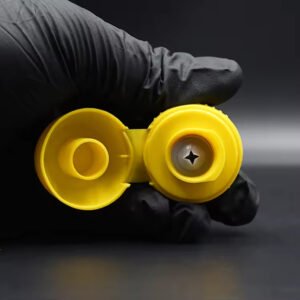
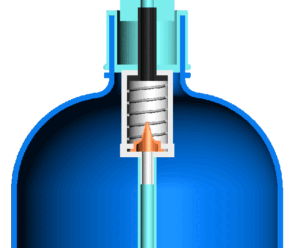
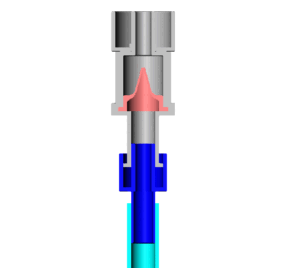
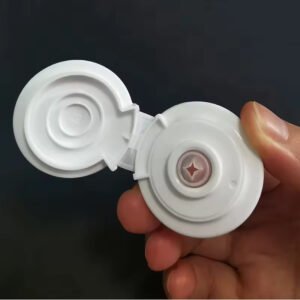
Produzione di valvole in silicone: Metodi e panoramica del processo
Le valvole in silicone sono componenti essenziali di molti sistemi di erogazione dei fluidi, in quanto offrono un controllo di precisione e una funzionalità a prova di perdite. La loro produzione prevede due metodi principali: stampaggio a compressione e stampaggio a iniezione di gomma siliconica liquida (LSR). Il metodo scelto dipende in larga misura dalla struttura della valvola e dal volume richiesto.
Stampaggio a compressione vs. stampaggio a iniezione LSR
Stampaggio a compressione è ideale per piccoli lotti o per progetti semplici. Si tratta di inserire il silicone preformato in una cavità dello stampo riscaldata, quindi di applicare una pressione per modellarlo.
Stampaggio a iniezione LSRè invece più adatto alla produzione di grandi volumi e a geometrie complesse. Garantisce una qualità costante con tolleranze ristrette, ideale per le valvole che richiedono prestazioni di precisione.
L'importanza della progettazione e della realizzazione degli stampi
Il cuore della produzione di valvole in silicone è progettazione e costruzione di stampi. Uno stampo ben progettato assicura una replica accurata delle specifiche della valvola, sia che si tratti di dimensioni, design della fessura o funzione di controllo del flusso.
Questa fase inizia con una stretta collaborazione tra ingegneri di prodotto e progettisti di stampi. Un software CAD avanzato viene utilizzato per simulare il comportamento della valvola in condizioni reali. Una volta finalizzato, lo stampo di alta precisione viene prodotto utilizzando la lavorazione CNC o l'elettroerosione, per garantire che lo stampo soddisfi i rigorosi standard del settore.
Uno stampo di alta qualità è fondamentale: non solo definisce le prestazioni della valvola, ma determina anche l'efficienza e la durata del processo produttivo.
Ispezione della qualità: Garantire precisione e prestazioni
La fase finale e più critica della produzione di valvole in silicone è ispezione della qualità. In questa fase, ogni valvola viene sottoposta a una valutazione approfondita per garantire la conformità ai rigorosi standard industriali e ai requisiti specifici del cliente.
Gli ispettori controllano che:
Difetti visivi come imperfezioni superficiali, deformazioni o scossoni.
Precisione dimensionale utilizzando strumenti di misura di precisione per verificare che le caratteristiche critiche, come lo spessore della fessura, il diametro esterno e l'allineamento della sede, corrispondano al progetto.
Prestazioni funzionaliTra cui la prova di tenuta, la convalida della pressione di apertura e il comportamento del controllo del flusso, particolarmente importante per le valvole utilizzate in applicazioni alimentari, mediche e di dosaggio.
A seconda dell'applicazione, è possibile eseguire ulteriori test, come ad esempio Conformità alla FDA, verifica della durezza del materiale (durometro), o controlli di resistenza termica possono essere eseguiti.
Lavorare con un produttore professionale di valvole in silicone
Le valvole in silicone sono componenti fondamentali in settori quali dispositivi medici, imballaggi per alimenti e bevande, dispenser per l'igiene personale, e sistemi di fluidi industriali. Il loro ruolo nel controllare il flusso di liquidi o gas, spesso con un funzionamento preciso e unidirezionale, li rende indispensabili sia nelle applicazioni ad alte prestazioni che in quelle di largo consumo.
Data la loro importanza funzionale, Collaborazione con un produttore professionale di valvole in silicone è essenziale. Un produttore affidabile offre:
Competenza nella selezione dei materialigarantendo l'uso di gradi di silicone conformi alle norme FDA o LFGB, adatti alle vostre applicazioni specifiche.
Capacità avanzate di progettazione e attrezzaggio degli stampi, con conseguente uniformità delle dimensioni della valvola e ripetibilità delle prestazioni.
Metodi di produzione flessibiliche comprende lo stampaggio a iniezione sia a compressione che LSR, per adattarsi a diversi progetti e volumi d'ordine.
Rigidi protocolli di controllo della qualitàcon una tracciabilità completa e test che garantiscono la conformità di ogni valvola agli standard funzionali e normativi.

